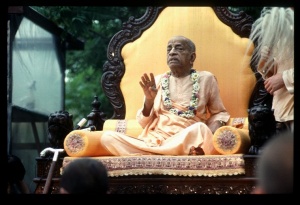SB 11.17.24: Difference between revisions
m (1 revision(s)) |
No edit summary |
||
| Line 1: | Line 1: | ||
{{info | {{info | ||
|speaker=Lord | |speaker=Lord Kṛṣṇa the Supreme Personality of Godhead | ||
|listener=Uddhava | |listener=Uddhava | ||
}} | }} | ||
[[Category:Srimad-Bhagavatam - Canto 11 Chapter 17]] | |||
[[Category:Bhagavatam Verses Spoken by Lord Krsna - Vanisource|111724]] | |||
<div style="float:left">'''[[Srimad-Bhagavatam]] - [[SB 11|Eleventh Canto]] - [[SB 11.17: Lord Krsna's Description of the Varnasrama System|Chapter 17: Lord Kṛṣṇa's Description of the Varṇāśrama System]]'''</div> | |||
<div style="float:right">[[File:Go-previous.png|link=SB 11.17.23]] '''[[SB 11.17.23]] - [[SB 11.17.25]]''' [[File:Go-next.png|link=SB 11.17.25]]</div> | |||
{{RandomImage}} | |||
{{SBnotice}} | |||
==== TEXT 24 ==== | ==== TEXT 24 ==== | ||
<div | <div class="verse"> | ||
snāna-bhojana-homeṣu | :snāna-bhojana-homeṣu | ||
japoccāre ca vāg-yataḥ | :japoccāre ca vāg-yataḥ | ||
na cchindyān nakha-romāṇi | :na cchindyān nakha-romāṇi | ||
kakṣopastha-gatāny api | :kakṣopastha-gatāny api | ||
</div> | </div> | ||
| Line 17: | Line 22: | ||
==== SYNONYMS ==== | ==== SYNONYMS ==== | ||
<div | <div class="synonyms"> | ||
snāna—while bathing; bhojana—while eating; homeṣu—and while attending sacrificial performances; japa—while chanting mantras to oneself; uccāre—while passing stool or urine; ca—also; vāk-yataḥ—remaining silent; na—not; chindyāt—should cut; nakha—the nails; romāṇi—or hairs; kakṣa—in the armpits; upastha—pubic; gatāni—including; api—even. | snāna—while bathing; bhojana—while eating; homeṣu—and while attending sacrificial performances; japa—while chanting mantras to oneself; uccāre—while passing stool or urine; ca—also; vāk-yataḥ—remaining silent; na—not; chindyāt—should cut; nakha—the nails; romāṇi—or hairs; kakṣa—in the armpits; upastha—pubic; gatāni—including; api—even. | ||
</div> | </div> | ||
{{SBcollapse}} | |||
==== TRANSLATION ==== | ==== TRANSLATION ==== | ||
<div | <div class="translation"> | ||
A brahmacārī should always remain silent while bathing, eating, attending sacrificial performances, chanting japa or passing stool and urine. He should not cut his nails and hair, including the armpit and pubic hair. | A brahmacārī should always remain silent while bathing, eating, attending sacrificial performances, chanting japa or passing stool and urine. He should not cut his nails and hair, including the armpit and pubic hair. | ||
</div> | </div> | ||
| Line 31: | Line 36: | ||
==== PURPORT ==== | ==== PURPORT ==== | ||
<div | <div class="purport"> | ||
Nārada Muni gives a similar technical description of Vedic brahmacārī life in Canto Seven, Chapter Twelve of Śrīmad-Bhāgavatam. | Nārada Muni gives a similar technical description of Vedic ''brahmacārī'' life in Canto Seven, Chapter Twelve of [[Srimad-Bhagavatam|''Śrīmad-Bhāgavatam'']]. | ||
</div> | </div> | ||
__NOTOC__ | </div> | ||
</div> | |||
<div style="float:right">[[File:Go-previous.png|link=SB 11.17.23]] '''[[SB 11.17.23]] - [[SB 11.17.25]]''' [[File:Go-next.png|link=SB 11.17.25]]</div> | |||
__NOTOC__ | |||
__NOEDITSECTION__ | |||
Revision as of 17:05, 30 June 2021

A.C. Bhaktivedanta Swami Prabhupada
Please note: The synonyms, translation and purport of this verse were composed by disciples of Śrīla Prabhupāda
TEXT 24
- snāna-bhojana-homeṣu
- japoccāre ca vāg-yataḥ
- na cchindyān nakha-romāṇi
- kakṣopastha-gatāny api
SYNONYMS
snāna—while bathing; bhojana—while eating; homeṣu—and while attending sacrificial performances; japa—while chanting mantras to oneself; uccāre—while passing stool or urine; ca—also; vāk-yataḥ—remaining silent; na—not; chindyāt—should cut; nakha—the nails; romāṇi—or hairs; kakṣa—in the armpits; upastha—pubic; gatāni—including; api—even.
Translation and purport composed by disciples of Śrīla Prabhupāda
TRANSLATION
A brahmacārī should always remain silent while bathing, eating, attending sacrificial performances, chanting japa or passing stool and urine. He should not cut his nails and hair, including the armpit and pubic hair.
PURPORT
Nārada Muni gives a similar technical description of Vedic brahmacārī life in Canto Seven, Chapter Twelve of Śrīmad-Bhāgavatam.